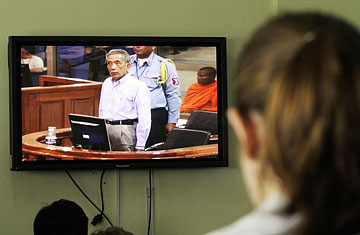
Journalists watch senior Khmer Rouge regime member Kaing Guek Eav, also known as Duch, on a live feed during the court session announcing the verdict of his trial at the Extraordinary Chambers in the Courts of Cambodia on the outskirts of Phnom Penh on July 26, 2010
(2 of 2)
By the time the S-21 detention center, located in Phnom Penh, was abandoned as invading Vietnamese forces took the capital in January 1979, the mass murders had spread to nearly every zone, district, ministry and military unit, capturing Duch's own childhood schoolteacher, his brother-in-law, his predecessor as chief of the S-21, the Minister of Finance, the Minister of Commerce, 5,000 government officials, 4,500 military personnel, 400 Vietnamese soldiers and civilians, a handful of captured Westerners and 200 of the S-21's own staff.
On Duch's detailed instructions, methods of torture included electrical shock, the force-feeding of human excrement, waterboarding, the removal of fingernails, the insertion of needles under the fingernails, suffocation and beating. Vivisections were performed on live prisoners, and the court determined that 100 people were executed by being bled to death. Pending their executions, seminude detainees were shackled in rows or kept in tiny brick cells on a starvation diet.
Duch remains part of a second case that includes four other suspects accused of the entirety of the regime's crimes. Though indictments in that case have yet to be handed down, the prosecutions promise to involve the largest number of victims in any trial since the Nazi war-crimes trials at Nuremberg.
With the guidance of his French defense lawyer, François Roux, Duch began his trial last year hoping to receive a lesser sentence by confessing to his crimes, promising to accept any punishment the court would impose and apologizing to his victims. But in a shock reversal, Duch told the court in November, "Release me," and his Cambodian lawyer, Kar Savuth, who boasts of close ties to the family of Prime Minster Hun Sen, has vowed to appeal.
Roux was fired earlier this month by Duch, who told the judges he had lost confidence in the attorney, an acclaimed litigator who won the first-ever acquittal at the Rwanda tribunal and now directs the defense office of the Special Tribunal for Lebanon at the Hague.
Youk Chhang, director of the Documentation Center of Cambodia, an organization that collected and preserved much of the evidentiary records used by the tribunal, says that in the capital, the verdict has been met with disbelief by many, with one man saying he wanted to punch his television screen. "I think they don't see any humanity in him at all," he said. "He was a living devil."
Chhang says he believes the verdict begins a "healthy" process of reconciling Cambodians with their history. "Any amount of years will not satisfy anybody," he said. "It is a difficult lesson for [Cambodians] to learn, but it will take time."
— With reporting by Kuch Naren / Phnom Penh
